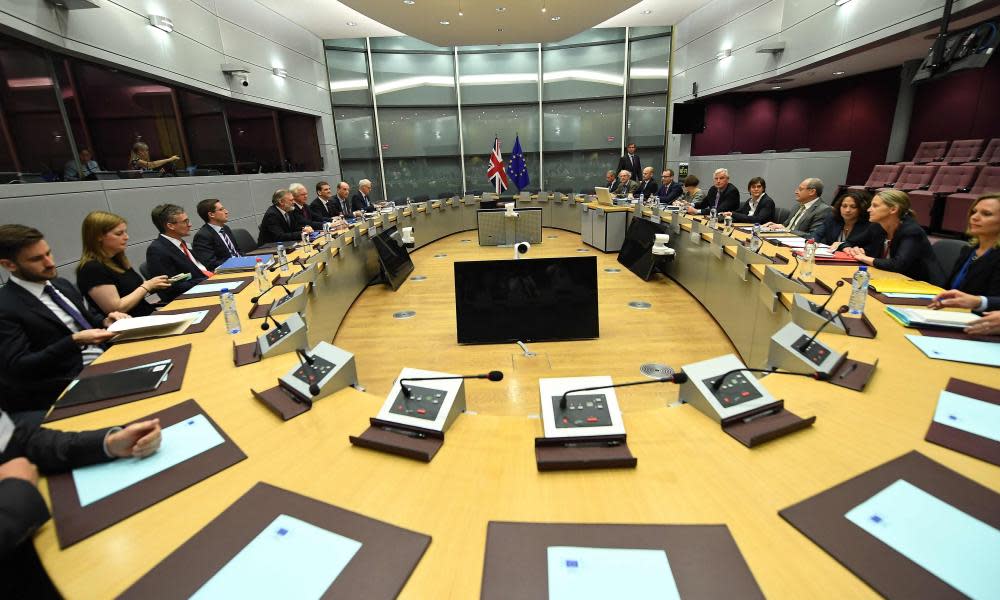All white and just one woman. Why is our Brexit team like this? | Tania Branigan

There is nothing shocking about the photos of the UK’s Brexit negotiating team. They are almost exactly as you would expect. Somehow, it is normal that a team working on behalf of 65 million people should contain no person of colour and “more beards than women” – an indication not of hipster tendencies in the civil service, but of the fact there is just one female member among the nine. These are the people charged with fulfilling Theresa May’s promise that “as we leave the European Union … we will make Britain a country that works not for a privileged few, but for every one of us”.
That the EU side is only slightly better is a demonstration of wider shortcomings, not a defence of the UK. That one very competent and capable woman made the cut does not prove meritocracy triumphed. People irked by all-male panels should consider this: while the Foreign Office boasts of the most diverse parliament ever, Brexit – the single issue likely to have the greatest impact on our future – is being negotiated by a team only marginally more representative than the Bullingdon boys who got us into this mess.
In large part that reflects the fact that while most civil servants are female, and 11% are from ethnic minorities, the numbers thin higher up the ranks: only three of the 12 members of the civil service board – the highest level of governance in the service – are women, and none are from ethnic minorities. It is a limited pool to begin with, and the Brexit team has been picked in large part according to their remits and background; it is a symptom of a much deeper issue.
Even so, it’s hard to argue that they were the only possible choices, not least given how recently many took their roles and their collective lack of EU expertise. The government’s reluctance to hear unwelcome news has contributed to an exodus by those with the most significant experience: notably Sir Ivan Rogers, who resigned as British ambassador to the EU, but also, for instance, Shan Morgan, his former deputy, now the top civil servant for the Welsh government.
Britain is pretty good at promoting the role of women in negotiations – where others are concerned. It is the official lead on UN security council resolution 1325, which stresses the role of women in preventing, managing and resolving conflict. That makes its failure more glaring.
“This is exactly the kind of ratio we have criticised again and again elsewhere,” said Heather Barr, senior researcher in the women’s rights division at Human Rights Watch, of the Brexit team. “In Afghanistan, for example, I’ve tracked the Taliban peace talks for years, and often lambasted how unfair – and ineffective – it is for two groups of men to sit across the table from each other trying to decide the country’s future.”
No one suggests that gender or ethnic identity is the only determinant of outlook and knowledge. Plenty of white men have championed causes primarily affecting women or ethnic minorities (though Brexit secretary David Davis is not renowned for his progressive outlook. But a more diverse group of decision-makers is likely to represent a more diverse set of interests and priorities – and also of perspectives, talents and instincts. All of those are essential in such talks, and especially so when the government has appeared keen to weed out challenging voices.
There’s a reason that asset managers and giant corporations like Sodexo, hardly in the vanguard of radical social change, want more women in senior positions. Research suggests that more diverse business teams perform better and are less likely to be captured by groupthink. The benefits have been seen in national affairs too: the UN says studies show that where women’s groups exercise a strong influence on peace negotiations there is a much higher chance of an agreement being reached, a greater likelihood of it being implemented and a higher probability of it lasting. A more inclusive negotiating team should be in the interests of everyone, however pale and male.
Of course, ardent Brexiters have had enough of experts. But others may want to look at the evidence, and at the demands of basic justice. Women don’t deserve representation because we are better or gentler or more willing to compromise (or, indeed, because we are wilier or tougher or more dogmatic). People of colour don’t need a seat at the table because we are the only ones who care about equality. The question is not why we should be included. The question is: why on earth aren’t we there?

 Yahoo News
Yahoo News 
